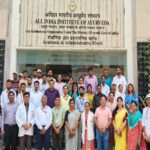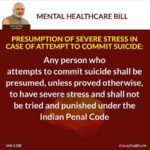Scope:This advisory on COVID-19 testing strategy is for:
(Version VII, dated 10thJanuary 2022)
India
healthysoch
New Delhi, January 11, 2022:


- Early detection of symptomatic cases for quick isolation and care.
- Early detection of infections in elderly (>60yr) and individuals with co-morbidities (diabetes, hypertension, chronic lung or kidney disease, malignancy, obesity etc) for quick care.
Spectrum of Tests available for COVID-19:
- Point-of-Care Tests: Home or Self-Test / Rapid Antigen Test (RAT)
- Molecular Tests: rRT-PCR, TrueNat, CBNAAT, CRISPR, RT-LAMP, Rapid Molecular Testing Systems, Newer SARS-CoV-2 Omicron or variant detection rRTPCR assays
Who may be tested:
A. In community settings:
1. Symptomatic (cough, fever, sore throat, loss of taste and/or smell, breathlessness and/or other respiratory symptoms) individuals.
2. At-risk contacts of laboratory confirmed cases. [At-risk contacts are elderly (>60yr) and individuals with co-morbidity such as diabetes, hypertension, chronic lung or kidney disease, malignancy, obesity etc].
3. Individuals undertaking international travel (as per country-specific requirements).
4. International travelers arriving at Indian airports/seaports/ports of entries as per laid down guidelines.
B. In Hospital Settings:
5. Testing may be undertaken as per discretion of the treating doctor with the following considerations:
- No emergency procedure (including surgeries and deliveries) should be delayed for lack of a test.
- Patients should not be referred to other facilities for lack of a testing facility. All arrangements should be made to collect and transfer samples to testing facilities, mapped to the health facility.
- Asymptomatic patients undergoing surgical / non-surgical invasive procedures including pregnant women in/near labour who are hospitalized for delivery should not be tested unless warranted or symptoms develop.
- Admitted patients may not be tested more than once a week.
People who need not be tested:
1. Asymptomatic individuals in community settings
- 2. Contacts of confirmed cases of COVID-19 unless identified as high risk based on age or comorbidities
- 3. Patients who stand discharged as per home isolation guidelines
- 4. Patients being discharged from a COVID-19 facility as per revised discharge policy
- 5. Individuals undertaking inter-state domestic travel
Important points to consider:
- Testing can be undertaken either through rRT-PCR, TrueNat, CBNAAT, CRISPR, RT-LAMP, Rapid Molecular Testing Systems or through Rapid Antigen Test (RAT).
- A positive point-of-care test [Home or Self-test / RAT] and Molecular Test is to be considered confirmatory, without any repeat testing.
- Point-of-care test [Home or Self-test / RAT] should be interpreted as per algorithm at Annexure. Symptomatic individuals, testing negative on Home/Self-test or RAT should undertake rRTPCR test as detailed in the algorithm.
List of approved home tests, RAT and rRTPCR kits are available at the following links:
- https://www.icmr.gov.in/pdf/covid/kits/COVID_Home_Test_Kit_23112021.pdf
- https://www.icmr.gov.in/pdf/covid/kits/List_of_rapid_antigen_kits_30122021.pdf https://www.icmr.gov.in/pdf/covid/kits/RT_PCR_Tests_Kits_Evaluation_Summ_231 22021.pdf
- Home Testing advisory of ICMR is available at: https://www.icmr.gov.in/pdf/covid/kits/Advisory_Home_Test_kit_19052021_v1.pdf
- All rRTPCR and RAT test results should be uploaded on ICMR portal at: https://cvstatus.icmr.gov.in.
- The vaccination status of all individuals tested for COVID-19 must be entered into the Sample Referral Form (SRF) in the RTPCR app both for individuals tested by rRTPCR and RAT. This information is of critical importance.
- Genome Sequencing is done for surveillance purposes and is not required to be undertaken for treatment purposes. Therefore, genome sequencing is to be performed only in a subset of positive samples as per recommendations of INSACOG (Indian SARS-CoV-2 Genomic Surveillance Consortium).
- The newer SARS-CoV-2 Omicron or variant detection rRTPCR assays are recommended to be used in areas with limited genomic surveillance capacity for quick detection of emergence of newer variants in such areas.
- ICMR’s advisory is generic in nature and may be modified as per discretion of the state health authorities for specific public health and epidemiological reasons
healhtysoch







